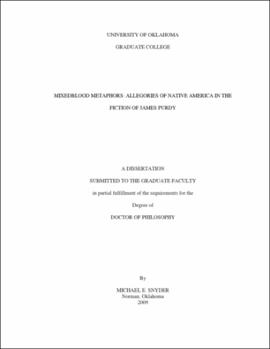| dc.description.abstract | "Mixedblood Metaphors" analyzes the Native American aspects of seven novels, one novella, and a few short stories by the U.S. author James Purdy (1914-2009). Purdy's engagement with indigeneity includes the creation of Native American and mixedblood characters, allusions to Native history and culture, and the use of figurative language. This engagement forms an integral part of Purdy's historical and racial allegories of America found in these works. Purdy's allegories engage troubling aspects of American history, exposing the violence and rapacity of Euro-American colonialism, and serve as a critique of American myths such as Manifest Destiny, wide open spaces, and white supremacy. While most non-Native writers neglect to mention Native Americans at all or are only able to imagine them as doomed, vanished, or absent, Purdy regards Natives as central to the formation of a truly American identity. Purdy imagines a new American character potential that blends the best qualities of Europe and aboriginal America and suggests the grim consequences of our failure to meet this potential. Purdy also makes rhetorical links between indigeneity and male same-sex desire, alluding to the same-sex and gender diversity traditions of most Native American tribes. Purdy positions himself as a "metaphorical crossblood," an ethical position that builds upon what I call his "imagined ancestry," sympathizing with Native perspectives. Although he initially focuses on criticizing Euro-Americans and pointing to Native victimization, with increased knowledge of Native literature and activism, over the course of his career Purdy's optimism for Native Americans develops and he eventually comes to advocate Native claims, and finally, tribal sovereignty. Thus I argue that Purdy is a non-Native writer whose work benefits from a Native Studies approach along with those of American Studies and Queer Theory. | |
